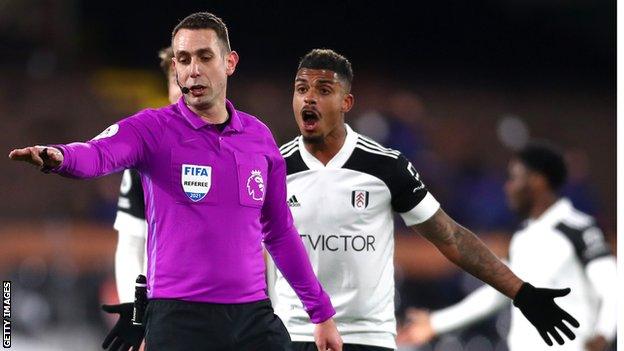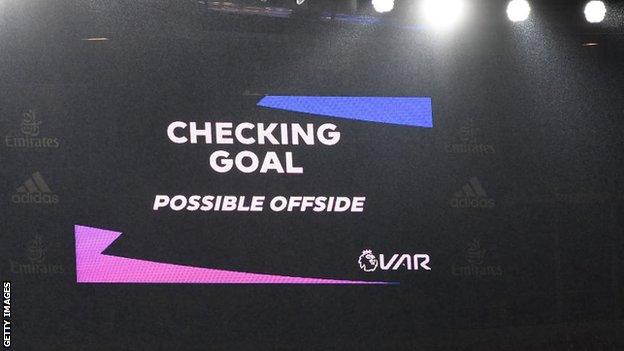Handball rule changed as football's law makers Ifab confirms new accidental ruling
- Published

Handball laws were tightened at the start of the 2020-21 season
Accidental handball that leads to a goal-scoring chance or a goal for a team-mate will no longer be penalised, say football's law makers.
Ifab confirmed the change on Friday, saying it was because of the "interpretation of handball incidents" not being applied consistently.
Fulham lost to Tottenham as Josh Maja was denied a goal as Davinson Sanchez's clearance flew into Mario Lemina's arm.
Ifab is also looking a possible change to the law regarding offsides.
Former Arsenal boss Arsene Wenger has proposed that a player should be considered onside if any part of their body that can legally score a goal is level with the second-last defender.
Fifa will also continue to test semi-automated technology to detect offside, whereby a signal is sent to the assistant referee almost instantly.
When will the handball rule change be introduced?
The change to the handball rule is likely to be introduced in England from 1 July.
It will remain a handball offence if a player scores accidentally with their hand or arm, or uses their hand or arm directly before scoring.
The International Football Association Board had tightened handball laws for the start of the 2020-21 season.
However, a spate of handball decisions led to fierce criticism across the game and saw English top-flight referees ordered to be less strict about their interpretations of the law.
Premier League officials were told to particularly focus on the distance an offending player is from the ball and whether he has extended his arm outside the natural body line.
Offside clarification and a rule-change trial
Ifab clarified its interpretation of the offside law, saying the definition for handball, whereby the arm ends at the bottom of the armpit, must be used when judging whether a player is offside or not.
Chelsea's Timo Werner was denied a goal against Liverpool on Thursday night when VAR ruled the position of his arm made him offside in the build-up.
Meanwhile, Wenger's proposed change to the offside law is set to be trialled in lower-league Chinese football and, if successful, could then be trialled in England, Football Association chief executive Mark Bullingham said.
"There are people who think it may lead to a more defensive game and others who think it would mean a more exciting game," Bullingham told BBC Sport. "Let's do the trial and find out."

New technology could, in theory, eliminate those moments when VAR is used to check whether a goal should be disallowed for offside
Fifa will also continue to test semi-automated technology to detect offside, with a signal sent to the assistant referee almost instantly.
That would leave referees and their assistants just needing to decide whether the offside player was interfering with play.
"Everyone recognises that when a goal is scored and fans have to wait to find out if it's a goal or not isn't a brilliant experience for the fans, particularly those in the stadium," added Bullingham.
"We are looking at technology where a linesman will immediately know if a player is offside or not and have that communicated to them and that allows them to make an instant decision, so in theory for offside decisions there would be no need to go back to the video assistant referee."

Supporting your immune system: Can eating certain foods help?
Radio 1's Screen Time: Daniel Radcliffe on his tense new prison-break thriller
